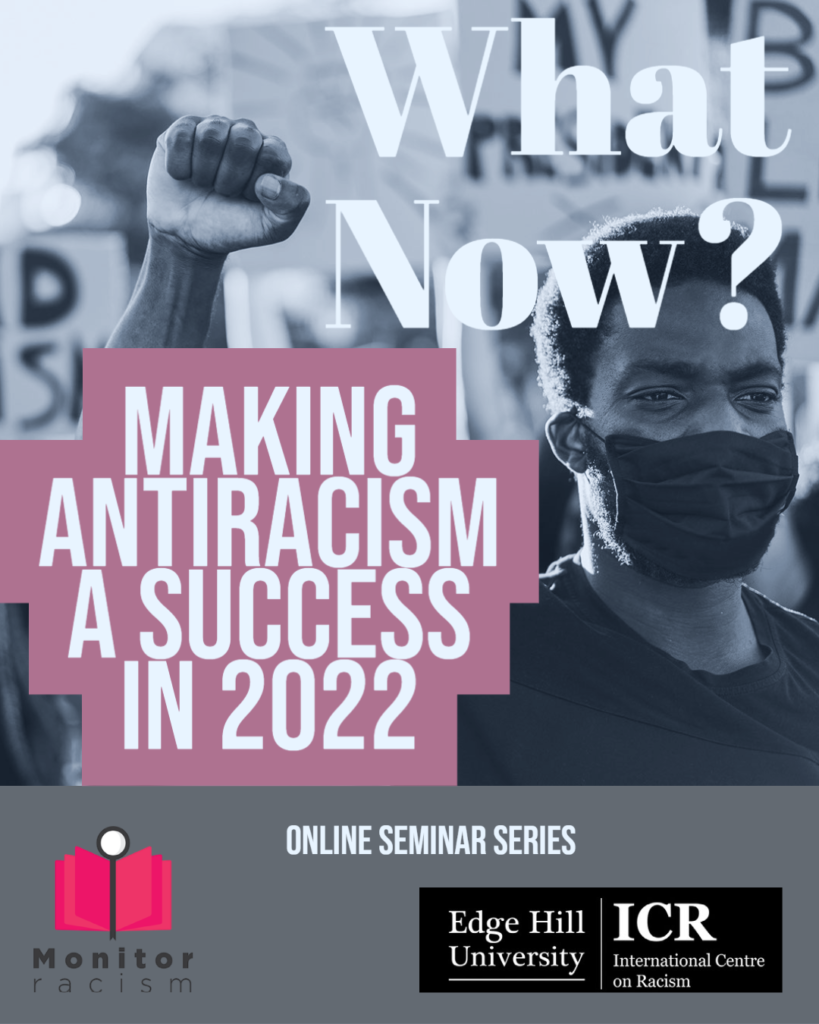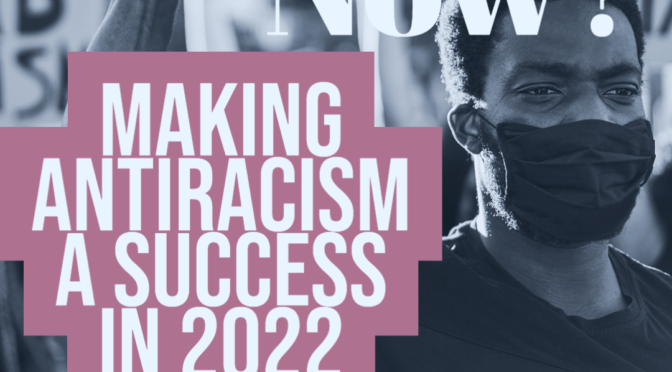The first part of the ICR/MONITORacism magazine seminar series on antiracism begins this month.
Session 1: 28 March 2022
Antisemitism
16.00-16.45
Addressing antisemitism within anti-racist pedagogy
Dr Mira Vogel, King’s College London and Dr Ben Gidley, Birkbeck College, UK.
Growing interest in anti-racist curriculum design does not tend to include antisemitism – at least not notably (Daniel et al, 2019). This may be because the study of racism and antisemitism has diverged in recent decades, and calls for reconnection are rarely amplified. Drawing on our experiences of teaching about antisemitism in a variety of contexts (including formal further and higher education settings, as well as civil society and social movement contexts), as well as on the research literature, we aim to give this divergence some attention by asking a foundational question: what makes it difficult learn and teach about antisemitism?
We use Meyer and Land’s idea of ‘threshold concepts’, in particular as formulated by Glynis Cousin, to illuminate the trouble with learning about antisemitism. Examples we discuss include Jewishness as distinct from Judaism; white Jewishness and black Jewishness; the relationship of Jews to concepts of power and privilege; how systemic analysis of racism can accelerate antisemitic tropes; antisemitism as a political as well as biological form of racialisation; and the elision of Jewishness and Zionism by both pro- and anti-Israel campaigners.
These ideas can be counter-intuitive or challenging, particularly as they relate to contemporary modes of thinking about racism, in ways which make antisemitism not only difficult but disturbing and provoking. Meanwhile for those who have internalised these concepts, the aspects which make them emotional are liable to become ‘conceptual submarines’, assumed but not made explicit, and so undetected by learners, which can make antisemitism difficult to learn about.
17.00-18.30
Roundtable in association with the Antisemitism Working Group (AWG), British and Irish Association for Jewish Studies (BIAJS)
Combating Antisemitism: Bringing Scholars and Jewish Communities into Dialogue
Chair: Professor James Renton, Chair, AWG, Co-Director, International Centre on Racism, Edge Hill University, UK.
Nina Freedman, President, Union of Jewish Students, UK.
Dr Mia Spiro, BIAJS executive committee, and Senior Lecturer in Modern Jewish Culture and Holocaust Studies, University of Glasgow, UK.
Rabbi Dr Charles Middleburgh, Dublin Jewish Progressive Congregation & Leo Baeck College, UK.
Over the last few years, the public debate in the UK about antisemitism in higher education has been riven by controversies, ranging from how we should define anti-Jewish prejudice to the ways in which it can be tackled. Jewish Studies scholars of antisemitism possess invaluable knowledge and training in their field of research; yet no formal mechanisms exist to connect these scholars with national and regional Jewish communal organisations.
In November, 2021, the British and Irish Association for Jewish Studies (BIAJS) published a statement on antisemitism, which pointed to the urgent importance of providing such a bridge between the academy and the community. Our proposal is to hold a round-table discussion as a first step in that direction. It will include representatives from the community, and from the BIAJS.
Session 2: 8 April 2022
Islamophobia
14.00-14.45
Addressing islamophobia/anti-Muslim racism: the litmus test of tackling structural racism in Europe
Julie Pascoët, Senior Advocacy Officer, European Network against Racism, Belgium.
Following the murder of George Floyd and the massive Black Lives Matter protests in Europe, there has been an increased recognition of structural racism, including in its historical and institutional dimensions. For example, the new EU anti-racism action, adopted as a way to address some of the concerns raised by protesters, acknowledges that: “Racist and discriminatory behaviours can be embedded in social, financial and political institutions, impacting on the levers of power and on policy-making. This structural racism perpetuates the barriers placed in the way of citizens solely due to their racial or ethnic origin.”
On the other hand, there has never been such violent opposition against this understanding of racism, including from institutions and those in power. In my talk, I will show how the widespread and unchallenged anti-Muslim narrative in Europe is not only leading to discriminatory policies and practices against racialized groups and beyond, but also preventing from addressing deeply embedded structural racism, especially in Western Europe where countries are the most influential. I will highlight what is the societal impact for not addressing islamophobia, beyond the consequences for Muslims or those perceived as such. Most importantly, I will explain what could be the main strategies to move forward and address Islamophobia and structural racism in Europe, in order to live up to the ambitions outlined in the EU anti-racism action plan. Addressing conspiracy theories, building post-narratives, enhancing intersectional organizing, will be some of the elements I will detail.
15.00-15.45
Anti-racism, Islamophobia and the politics of police abolition
Dr Scarlet Harris, Postdoctoral Fellow, University of Manchester, UK.
The re-emergence of the global Black Lives Matter movement in the summer of 2020 coalesced with the first waves of the Covid-19 pandemic and associated rafts of unprecedented police powers. Soon after, protests against the Conservative government’s Police, Crime, Sentencing and Courts bill swept the UK. Within this context, issues of policing and criminalisation increasingly took centre stage in discussions about racism and anti-racism, and an abolitionist vocabulary appeared to move (at least momentarily) from the margins and into the mainstream.
At the same time, ongoing resistance to state-sanctioned Islamophobia – the majority of which has been driven by Muslim-led organisations and communities – has focused on the securitisation of Muslims in Britain and beyond. But these two key strands of anti-racist work have tended to remain politically and analytically distinct. This contribution will bring together these two areas of anti-racist thought and action to explore the possibilities for solidarity-building in the current moment.
In considering organised resistance to Islamophobia in light of recent shifts towards a politics of police abolition in Britain, I will ask: how does the issue of policing intersect with state-sanctioned Islamophobia? How might an expanded, radical critique of policing in the current moment facilitate broader and more durable anti-racist coalitions? And what might this mean for building international resistance to the global ‘war on terror’ and its entanglements with various forms of policing?


